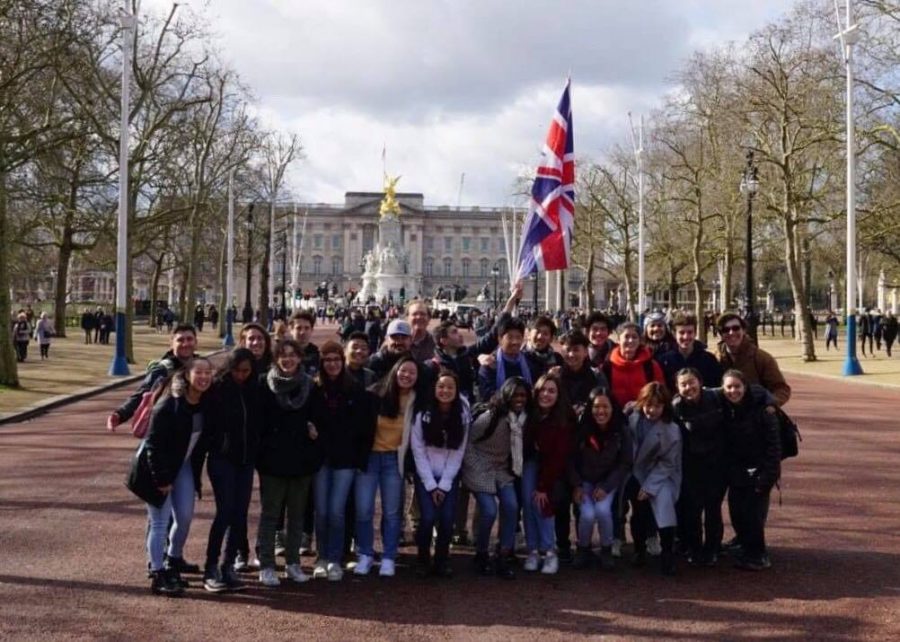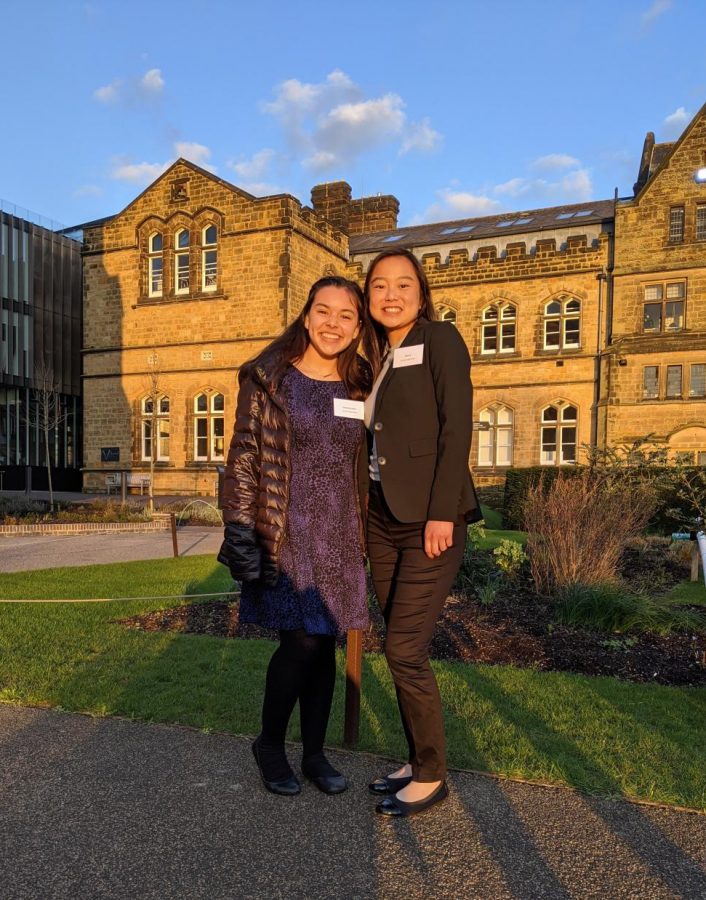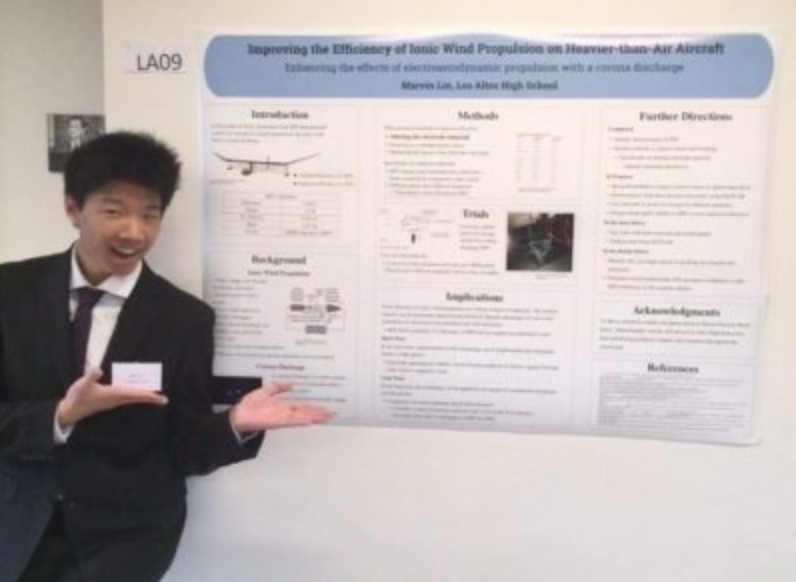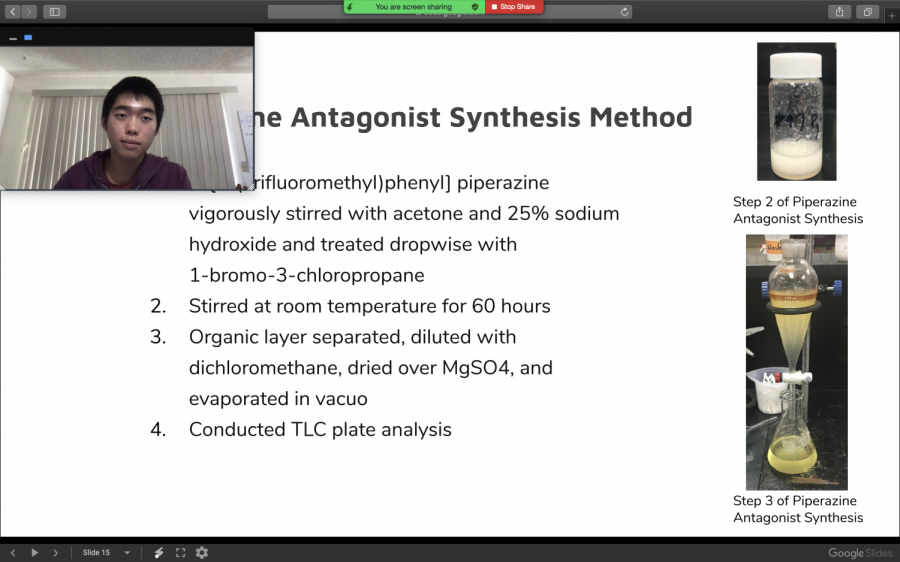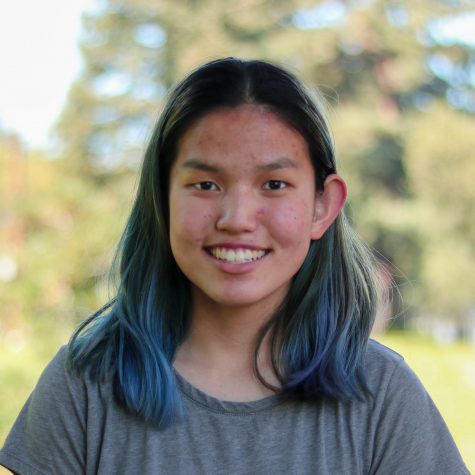In Los Altos High School’s Advanced Student Investigations (ASI) class, students step into the role of professional researchers as they investigate in-depth topics of their choice and present their year-long research for their culminating projects. Prior to COVID-19, the ASI class traveled to London to present their research to students abroad.
ASI students: investigating their way through senior year
July 10, 2020
Los Altos High School’s Advanced Student Investigations (ASI) class is known for its in-depth projects and unparalleled research opportunities. In the class, students spend the majority of the year conducting research on and experimenting with a scientific topic of their choice. Projects range from creating a chemical to relieve symptoms of eczema to engineering a plane with no moving parts.
When the school year comes to a close, ASI students prepare for multiple panels and presentations to demonstrate and explain their findings. However, due to the pandemic students gave virtual presentations on their topics over Zoom from Thursday, April 30, to Friday, June 5.
Cassandra Sweet and Olivia Ih
Courtesy Cassandra Sweet and Olivia Ih
Class of 2020 graduates Cassandra Sweet and Olivia Ih researched how to use compounds within turmeric to treat inflammation in the brain related to Alzheimer’s disease.
Class of 2020 graduates Cassandra Sweet and Olivia Ih entered ASI knowing they would be a good fit as research partners. Both knew each other before joining the class and previously volunteered together with the STEAM Team club at LAHS. The seniors had little experience researching and wanted to get a taste of what it was like in a lab environment.
“We both knew that we didn’t want to do individual projects because neither of us had ever done scientific research before,” Olivia said. “We just gravitated toward each other.”
Although it was a given that the two would be working together, instead of conducting research the first few months of school, the seniors spent a significant chunk of the fall semester trying to nail down a topic.
Upon starting the class, one of their original ideas was to research peanut allergies. Because Olivia grew up with a peanut allergy, she had a personal connection with the topic. This connection sparked their interest for further research into treatments for the health condition.
Unfortunately, some of their planned procedures were too expensive. Even though the LAHS lab is relatively high tech, it does not have the facilities to conduct protein engineering, which would be required for their research.
Olivia recounts that earlier in the year, ASI’s teacher-adviser Darren Dressen gave them an old lab paper and suggested researching turmeric’s anti-inflammatory properties. He also mentioned Alzheimer’s as a potential application of that research. With this new direction, their research became more chemically focused and more manageable with the resources available in their lab. Cassandra and Olivia settled on doing research using basic compounds within turmeric to treat inflammation in the brain that’s related to Alzheimer’s disease.
Even though they had decided on a research topic, time was not on their side.
“We didn’t get as far as we wanted to because we spent the first couple months of the school year just trying to figure out what we wanted to do,” Olivia said. “We didn’t get truly started on our product until Christmas break.”
The recent effects of COVID-19 cut their in-person research time even shorter, leaving Cassandra and Olivia racing to finish their work at home.
“Obviously ASI is very lab based for the majority of the projects, especially for ours, so we basically stopped everything,” Cassandra said.
Their research was ground to a halt, and their presentation plans changed as well. ASI presentations were originally set to occur in the cafeteria but had to become virtual.
“Information-wise, presenting online didn’t have a really big impact,” Cassandra said. “However, the in-class presentation is a lot more fun in person because we all hype each other up. It’s just a different vibe over Zoom.”
Even though ASI proved to be challenging, both seniors developed an interest in conducting their own future research.
“The process is so long that you need to find a project or topic that you’re super passionate about in order for the research to be something worth doing,” Olivia said.
Cassandra and Olivia will be roommates at the University of California, Irvine, the coming fall; Olivia is looking to major in computer science and Cassandra is going in as undeclared. Both are looking forward to having a friend on campus and to growing closer throughout their college experience.
Marvin Lin
Class of 2020 graduate Marvin Lin researched aerospace engineering and sustainable energy, specifically ionized wind propulsion to create a more efficient plane design for his project. Unlike other students who focused more on biology and chemistry based approaches, Marvin involved both physics and engineering in his research in an attempt to improve a plane design created by MIT.
What brought Class of 2020 graduate Marvin Lin to ASI was the creativity and originality that came with the class. There, he was able to research topics that could potentially impact the world outside of the classroom setting.
“I like going through the process of trying to discover something new in the scientific field rather than reading what someone else did in a paper,” Marvin said.
Marvin’s topic focused on aerospace engineering and sustainable energy, specifically ionized wind propulsion. This technique is used by scientists to ionize air using high voltage electrodes, electrical conductors that carry electric current into non-metallic substances, and accelerate it, creating ionized wind.
His project was based on a plane design created in 2018 by MIT that had no propellers, turbine blades or fans. Instead, the plane used ions to generate enough thrust to get the plane airborne for an extended period of time.
In an experiment conducted the same year, MIT’s efficiency was calculated to be 2.56 percent, the efficiency being the ratio of outputted energy compared to the inputted energy.
In Marvin’s smaller scale research, he planned to verify whether the alteration of certain variables of the plane would yield various efficiencies and to build a more efficient replica of MIT’s original plane based on those variables. Marvin also looked to improve the plane’s efficiency by ultimately finding a way to input less energy, while outputting more.
Due to the limitations of COVID-19, Marvin had to work around being unable to do any physical research at home. He had access to articles and papers concerning his research, but he had not been able to physically create any part of his project during quarantine because his supplies were all still at school.
Additionally, conducting his experiments on campus was also safer with Dressen and other trained professionals standing by, as well as extra protective gear. For instance, Marvin’s project used 400 kilovolts of electricity to power the electric field, which could be harmful to the human body if physical contact is made.
Leading up to the virtual presentation, Marvin was unsure how his research would be received since he had fewer tangible results than his peers. The experience, however, ended up going much better than he anticipated.
“I felt like my project was going to be underwhelming compared to the other ones, but everyone respects the research others are doing,” Marvin said. “Since each person researches their own project for the entire year, there’s so much depth to the presentation, which makes every project interesting.”
Marvin’s presentation had great results despite his challenges, and he left ASI with a new outlook on the researching process.
“When you’re researching something, you’re creating something new rather than following in the footsteps of someone else,” Marvin said. “The topic you’re researching has never been researched before. This experience shifted my mindset to not being afraid to try new things.”
Even though Marvin’s research was cut short in high school, he hopes to continue researching in the aerospace field at the Boeing Company near where he plans to attend the University of Washington in the fall.
Tony Lam
For his project, Class of 2020 graduate Tony Lam researched the eczema, a chronic skin condition and a potential treatment for itchiness, a common symptom. Along with his peers, Tony presented his research virtually and enjoyed reflecting on how much he’s progressed as a researcher and presenter.
Class of 2020 graduate Tony Lam’s passion for chemistry was sparked by his curiosity and interest in the series of labs he completed during the Chemistry Honors course.
“The most special moment for me was during the titration lab where I experimented with acids and bases,” Tony said. “Watching the colors of my chemical solution change was fascinating to me. This fascination for chemistry was one of the reasons I chose a chemistry-related topic in ASI.”
Tony enjoyed his hands-on experiences in his core science classes, but wanted to take it to the next level. Despite his enthusiasm, his transition between Chemistry Honors and ASI was not intuitive due to the immense knowledge gap he had to fill.
The Chemistry Honors course is heavily textbook-based while in ASI, students are able to independently design their own experiments. Despite the additional challenge, Tony was able to adapt to the intensity of the extensive research ASI is known for.
“Accommodating the jump definitely required some self-reflection and evaluation on my part. I was well aware of how intelligent and innovative my ASI classmates were, so that provided me with some motivation to not give up,” Tony said.
In ASI, Tony was able to explore the topic of his choice, chemical synthesis, in greater depth. Through chemical synthesis, Tony was able to combine multiple chemicals to form a more complex chemical product.
He decided to research the topic of eczema, a chronic skin condition that tends to result in dry skin. Tony has had eczema since childhood and was drawn specifically to the topic due to his personal experience.
“I felt that choosing a topic that was personal to me would be a very good motivator for me to keep researching,” Tony said. “It would also allow me to find out more about the current treatments for my condition.”
Tony’s project focused on creating a chemical that will bind to and terminate the receptor that causes the itch. Due to COVID-19, however, Tony was unable to finalize his research, putting him in a similar position to his peers.
Despite the unfortunate circumstances, Tony saw the restriction as an opportunity to take a step back from the physical experimentation and do further literary research on his topic at home.
In the days leading up to his Zoom presentation, Tony looked forward to seeing his growth as a scientist and presenter through participating in ASI.
“It’s nerve-racking the first time we present, but after a couple of times it becomes natural,” Tony said. “So I guess I’m looking forward to giving a much better presentation than I have when I first started ASI.”
Looking back on the class, ASI allowed Tony to pursue research on a topic that interested him while being surrounded by peers with similar driven mindsets.
“ASI was a community,” Tony said. “It was just a very unique environment that enabled me to branch out and do things I’ve always wanted to try.”
Tony will be studying physics or molecular and cell biology at the University of California, Berkeley in the fall. In addition to the school being closer to home, he is looking forward to the research opportunities the public research university has to offer.
Ava Milliken
Joining ASI was almost a no-brainer for Class of 2020 graduate Ava Milliken. Her older sister had taken the class a couple of years earlier, and Ava herself had previously done research on climate change at the University of California, Santa Barbara and research on air pollution at Stanford.
Ava’s research in ASI focused on bioremediation, the process of using living organisms to break down pollutants in the environment.
“I had done AP Biology and AP Environmental Science during my junior year,” Ava said. “I was really interested in those two fields of science and researching bioremediation was the perfect intersection of my interests.”
Bioremediation is the process of clearing polluted sites by introducing microorganisms that can break down the environmental pollutants in that designated environment. Through her research, Ava observed the rate at which the bacteria, or microorganisms, break down different types of pollutants to see which interaction was the most effective. Her research materials included polycyclic aromatic hydrocarbons (PAHs), a common class of pollutants, and Micrococcus luteus, a single bacteria that could potentially degrade that pollutant.
Despite nearly a school year’s worth of research, Ava, unlike her peers, was unable to present at the science conference during ASI’s trip to England early in the spring due to the COVID-19 outbreak.
“I was the only student who decided to pull out of the trip because of the virus,” Ava said. “I didn’t get to present my research at Tonbridge, a boarding school in London, and I was really looking forward to presenting there.”
Unfortunately, Ava also felt the effects of the school’s closure on her research process. She was unable to finish her trials and was initially planning on starting a whole new round of data collection that was ultimately never produced.
“It is kind of a bummer that we got all the way to the finish line and nobody got to fully execute everything they wanted to do,” Ava said.
With the bulk of her research completed in class, Ava was able to prepare for her virtual presentation without major difficulty. The ASI Zoom presentations gave Ava the long-awaited opportunity to share her research with her classmates; it was also a chance for her to see what her classmates had prepared.
“I’ve actually had a great time listening to other people’s presentations,” Ava said. “I hope to have a similar engaging effect on my classmates by introducing them to the potential advances that could be made in this field through projects like mine.”
Despite endless challenges, ASI helped Ava build on her past research experience and has prepared her for more advanced future research projects.
“ASI confirmed my passion for environmental science,” Ava said. “It’s also taught me a lot about self-motivation and putting in the time to follow through on work that no one is holding you accountable for.”
Ava will be attending Tulane’s Honors College in the fall and currently looks to major in environmental studies and minor in business.

